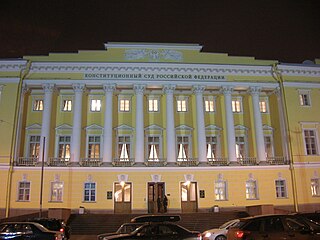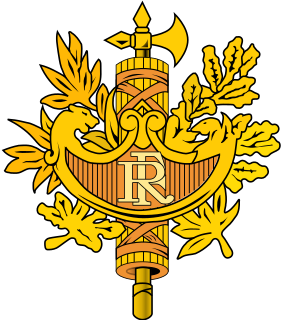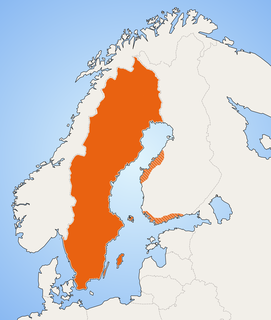
The federal government of Nigeria is composed of three distinct branches: legislative, executive, and judicial, whose powers are vested by the Constitution of Nigeria in the National Assembly, the President, and the federal courts, including the Supreme Court, respectively.
The Government of Italy is a democratic republic established by a 1946 constitution. It consists of legislative, executive, and judicial subdivisions, as well as a Head of State, or President.
Politics of Sweden takes place in a framework of a parliamentary representative democratic constitutional monarchy. Executive power is exercised by the government, led by the Prime Minister of Sweden. Legislative power is vested in both the government and parliament, elected within a multi-party system. The Judiciary is independent, appointed by the government and employed until retirement. Sweden is a monarchy.
The Basic Laws of Sweden are the four fundamental laws of the Kingdom of Sweden that regulate the Swedish political system, acting in a similar manner to the constitutions of most countries. These are the Instrument of Government, the Freedom of the Press Act, the Fundamental Law on Freedom of Expression and the Act of Succession. Together, they constitute a basic framework that stands above other laws and regulation, and also define which agreements are themselves above normal Swedish law, but subordinate to the fundamental laws, namely the European Convention on Human Rights and several UN and EU treaties and conventions.
Riksdag of the Estates was the name used for the Estates of Sweden when they were assembled. Until its dissolution in 1866, the institution was the highest authority in Sweden next to the King. It was a Diet made up of the Four Estates, which historically were the lines of division in Swedish society:

The Council of the Realm, or simply The Council, was a cabinet of medieval origin, consisting of magnates which advised, and at times co-ruled with, the King of Sweden.
The Union and Security Act, alternately Act of Union and Security was proposed by king Gustav III of Sweden to the assembled Estates of the Realm during the Riksdag of 1789. It was a document, adding to the Swedish Constitution of 1772 new provisions. The King strengthened his grip on power, while at the same time riding on a popular wave that also meant the decrease in aristocratic power. It has been described as "fundamentally conservative".
A decree is a rule of law usually issued by a head of state, according to certain procedures. It has the force of law. The particular term used for this concept may vary from country to country. The executive orders made by the President of the United States, for example, are decrees. In non-legal English usage, however, the term refers to any authoritarian decision. Documents or archives in the format of royal decrees or farming were issued by rulers.
Constitutionality is the condition of acting in accordance with an applicable constitution; the status of a law, a procedure, or an act's accordance with the laws or guidelines set forth in the applicable constitution. When one of these directly violates the constitution, it is unconstitutional. All the rest are considered constitutional until challenged and declared otherwise, typically by courts through judicial review.

The Supreme Court of Sweden is the supreme court and the third and final instance in all civil and criminal cases in Sweden. Before a case can be decided by the Supreme Court, leave to appeal must be obtained, and with few exceptions, leave to appeal can be granted only when the case is of interest as a precedent. The Supreme Court consists of 16 Justices who are appointed by the government, but the court as an institution is independent of the Riksdag, and the Government is not able to interfere with the decisions of the court.

In the United States, judicial review is the ability of a court to examine and decide if a statute, treaty or administrative regulation contradicts or violates the provisions of existing law, a State Constitution, or ultimately the United States Constitution. While the U.S. Constitution does not explicitly define a power of judicial review, the authority for judicial review in the United States has been inferred from the structure, provisions, and history of the Constitution.

The Constitutional Court of the Russian Federation is a high court within the judiciary of Russia which is empowered to rule on whether certain laws or presidential decrees are in fact contrary to the Constitution of Russia. Its objective is only to protect the Constitution and deal with a few kinds of disputes where it has original jurisdiction, whereas the highest court of appeal is the Supreme Court of the Russian Federation.
The Council on Legislation is a Swedish Government Agency composed of current and former justices of the Supreme Court and Supreme Administrative Court. Its function is to pronounce on the legal validity of legislative proposals at the request of the Government or a Riksdag standing committee.

The judiciary of Somalia is defined by the Provisional Constitution of the Federal Republic of Somalia. It stipulates that the national court structure is to be organized into three tiers: the Constitutional Court, Federal Government level courts, and Federal Member State level courts. A future nine-member Judicial Service Commission is empowered to appoint any federal tier member of the judiciary. It also selects and presents potential Constitutional Court judges to the House of the People of the Federal Parliament for approval. If endorsed, the President then appoints the candidate as a judge of the Constitutional Court. The five-member Constitutional Court is likewise empowered to adjudicate issues pertaining to the constitution, in addition to various federal and sub-national matters.
United Kingdom administrative law is a branch of UK public law concerned with the composition, procedures, powers, duties, rights and liabilities of public bodies that administer public policies. The general principle is that a public official, or an "administrator must act fairly, reasonably and according to the law. That is the essence and the rest is mainly machinery."
Judicial review is a process under which executive or legislative actions are subject to review by the judiciary. A court with authority for judicial review may invalidate laws acts and governmental actions that are incompatible with a higher authority: an executive decision may be invalidated for being unlawful or a statute may be invalidated for violating the terms of a constitution. Judicial review is one of the checks and balances in the separation of powers: the power of the judiciary to supervise the legislative and executive branches when the latter exceed their authority. The doctrine varies between jurisdictions, so the procedure and scope of judicial review may differ between and within countries.

The politics of France take place with the framework of a semi-presidential system determined by the French Constitution of the French Fifth Republic. The nation declares itself to be an "indivisible, secular, democratic, and social Republic". The constitution provides for a separation of powers and proclaims France's "attachment to the Rights of Man and the principles of national sovereignty as defined by the Declaration of 1789."

Kosovo has a civil law system which is also sometimes known as Continental European law system. The central source of law that is recognized as authoritative is codifications in a constitution or statute passed by legislature, to amend a code. This system of Kosovo has experienced several changes throughout the years and is currently a system that includes prominent bodies and branches that help Kosovo enact adequate laws and conduct proper legal procedures.
There are 15 parliamentary committees in the Riksdag, Sweden's parliament. Each committee is made up of seventeen elected MPs, with at least one member from each political party.
Scandinavian law, alternatively known as Nordic Law is the law of the five Nordic countries, namely Denmark, Finland, Iceland, Norway and Sweden. It is generally regarded as a subgroup of civil law or as an individual legal body in itself. Prior to the 19th century, the European countries were independent in their administering and legality. However, in 1872, the Nordic countries organised legislative cooperation. Especially in areas of contracts and commerce, as well as those concerned with family, nationality and extradition, the five states have obtained uniform legislation.











